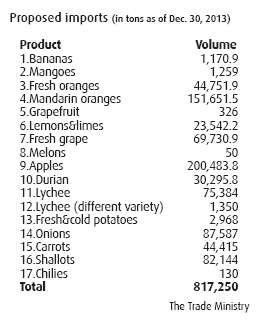 In a bid to meet rising domestic demand, the government will more than double the import volume of fruit and vegetables in 2014 from last year.
In a bid to meet rising domestic demand, the government will more than double the import volume of fruit and vegetables in 2014 from last year.
Trade Ministry director-general for foreign trade Bachrul Chairi confirmed that the government would allow the import of 17 horticulture products, including apples, mangoes, oranges, potatoes, chilies and shallots, tentatively totaling 600,000 tons in the first half of 2014, up 130.8 percent from 260,000 tons in the same period last year.
Although it is a significant increase from last year, the figure is only about half of the 1.1 tons requested earlier by importers.
As of Dec. 30, importers proposed permits to source overseas 817,250 tons, comprising 599,996 tons of fruit, 134,970 tons of vegetables and 82,284 tons of chilies and shallots.
“We will be strict with importers. They must realize at least 80 percent of their approved import volumes, otherwise we will revoke their permits,” Bachrul said. He said the ministry would allow importers to lower the import volume they earlier proposed until early January.
In response to local stakeholders’ rising concerns over the much higher import volume, Bachrul said that the government wanted to test the market mechanism after it eased horticulture imports late last year.
Raw foods, particularly certain horticulture products such as shallots and chilies, as well as meat, have been the key contributors to inflation in Southeast Asia’s biggest economy, which is most often tackled through imports.
The Trade Ministry recently granted import permits for 35 companies to import 130,245 head of feedlot cattle and 22,860 head of slaughter-ready cattle for the first quarter of 2014.
Last year witnessed an irregular rise in inflationary pressure following a stricter horticulture import policy introduced by the government, which it then relaxed.
“In the second half of this year, the importers will hopefully become more rational about market demands and adjust themselves,” he said.
Gun Soetopo, the secretary-general of the National Horticulture Council, criticized the government’s move to increase the import volume of fruit and vegetables, saying that it would hurt domestic farmers and should only be applied temporarily.
Instead of importing raw foods, Gun said, the government should facilitate the importation of seeds because doing so would improve production and thereby boost
local supplies. “The trend will continue in the coming years with the country importing higher volumes of horticulture products unless the domestic supply problem is addressed.” he said.
Apart from enhancing the upstream side of the horticulture industry, including through better access to technology, the government should also solve constraints in the distribution system, he added.
Source: The Jakarta Post
